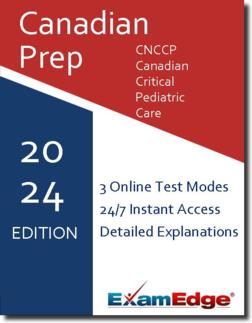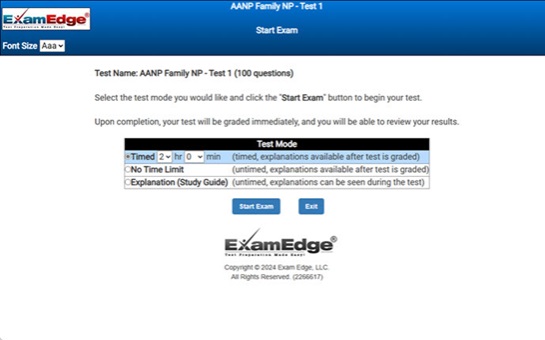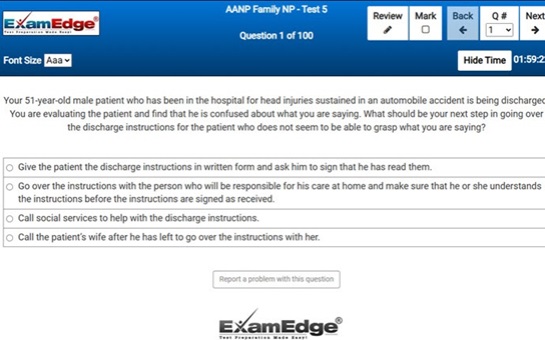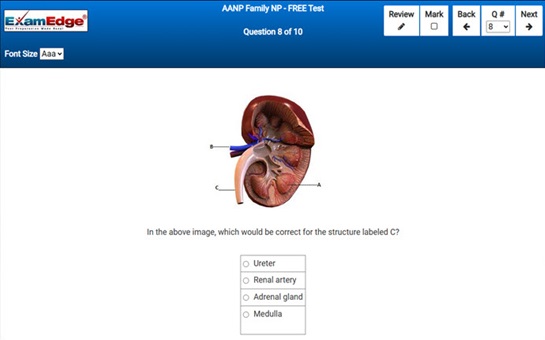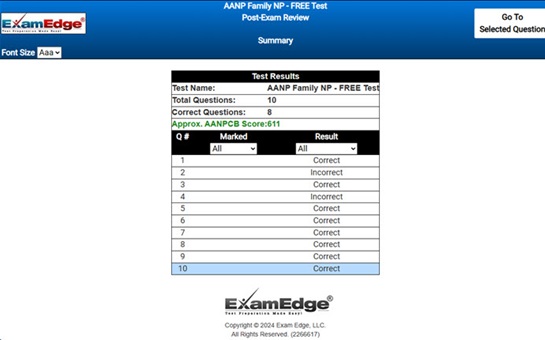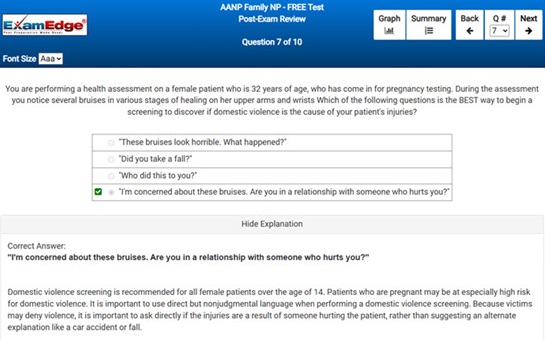CNCCP - Canadian Critical Pediatric Care (CNCCP) Practice Tests & Test Prep by Exam Edge
CNCCP - Canadian Critical Pediatric Care Product Infomation
Get Instant Online Access Now!
** Sample images, content may not apply to your exam **
Ready to advance? Let Exam Edge help! The CNCCP - Canadian Critical Pediatric Care exam is a pivotal opportunity to demonstrate your skills. Set yourself up for success with practice tests from Exam Edge!
Our practice tests are designed to help you master both the subject matter and the art of test-taking. Created to mimic the real exam, our practice tests feature:
- Instant access to your online practice tests
- Unlimited Test Access - available 24/7
- Timed, untimed, and "study guide" modes
- Detailed explanations for each question
- 10 online practice exams with 100 unique questions per exam
- 1,000 unique questions, if you purchase all 10 exams
Start exam prep today with a Canadian Critical Pediatric Care Nursing Examination: practice test from Exam Edge!
Select Your Test Bundle
Excellent

"My favorite thing about ExamEdge's online practice test is that they mimicked the actual exam. I walked into the exam feeling confident I knew the material and walked out knowing my time studying with Exam Edge was well worth the effort."
CNCCP - Canadian Critical Pediatric Care (CNCCP) Shortcuts
General Exam Info
Features
Study Plan Tips
Test Reviews
Why Exam Edge?
FAQ
Related Blogs
Take a FREE Test
Pass Your Canadian Critical Pediatric Care Nursing Examination: Certification Exam with Exam Edge
Are you nervous about your upcoming Canadian Critical Pediatric Care Nursing Examination: certification exam? Look no further, Exam Edge is here to help you achieve your goal! Our world-class online practice certification tests are designed to provide you with the knowledge and confidence you need to pass your CNCCP - Canadian Critical Pediatric Care exam on your first try!Key Facts on Exam Edge's online practice tests for your Canadian Critical Pediatric Care Nursing Examination: Exam.
- 10 Online Practice Exams: With Exam Edge, you'll have access to 10 practice tests available, each with 100 questions, to help you thoroughly prepare for your CNCCP - Canadian Critical Pediatric Care (CNCCP) exam.
- Instant Access: Get started right away with instant access to your online practice exams. No waiting or software installation required!
- Detailed Explanations: Each question is accompanied by a detailed explanation, so you'll fully understand the reasoning behind the correct answer and improve your knowledge.
- Take Each Exam 4 Times: You can take each of our practice exams up to 4 times, giving you plenty of opportunities to review and master the material.
- Web-Based: Our practice tests are available 24/7 at your convenience, and because they are web-based, there is no software to install.
- Psychological advantage: Exam Edge practice tests will allow you to walk into your test day with confidence.
Exam Edge practice tests are a valuable tool for helping you prepare for the Canadian Nursing (CNCCP) certification exam. The practice tests provide a realistic simulation of the actual exam, allowing you to become familiar with the format, style, and types of questions you will encounter on the actual test. Certification exams don't just measure what you know -- they are also a test of how well you perform under pressure. The right type of test preparation helps you familiarize yourself not only with the material you're being tested on, but also the format of the test, so you feel less anxiety on test day.
Canadian Critical Pediatric Care Nursing Examination: - General Exam Info Sample Questions
|
|
|
|
Canadian Critical Pediatric Care Nursing Examination: (CNCCP) Exam Prep
Our comprehensive Canadian Critical Pediatric Care Nursing Examination: practice tests are designed to mimic the actual exam. You will gain an understanding of the types of questions and information you will encounter when you take your Canadian Nursing Certification Exam. Our CNCCP - Canadian Critical Pediatric Care Practice Tests allow you to review your answers and identify areas of improvement so you will be fully prepared for the upcoming exam and walk out of the test feeling confident in your results.
How to Prepare for the Canadian Critical Pediatric Care Nursing Examination: Exam
So, you've decided to pursue your CNCCP - Canadian Critical Pediatric Care certification. Not sure what comes next? Follow these steps to register for the exam, craft an effective study plan, and go into test day feeling confident.
Step 1: Check Eligibility and Apply for Canadian Critical Pediatric Care Nursing Examination:
Start by researching the testing agency or credentialing organization and the different exams they offer for your field. Before you register for your exam, make sure that the CNCCP - Canadian Critical Pediatric Care exam is the right match for your education, experience, and career goals.
Then, check whether you meet the requirements for taking the CNCCP - Canadian Critical Pediatric Care exam. You can find eligibility information on the Canadian Nursing website: Canadian Nursing (Canadian Nursing). Once you have determined that you meet the qualifications or have completed the appropriate prerequisites, you can register with the organization and apply to take the CNCCP - Canadian Critical Pediatric Care exam.
Step 2: Schedule the CNCCP - Canadian Critical Pediatric Care
Once you have registered, you are ready to schedule your exam! The Canadian Critical Pediatric Care Nursing Examination: exam is offered at various times throughout the year and at various locations across the United States. You can use the Canadian Nursing website to find a testing center near you and choose a date and time that suits your availability.
When you schedule your CNCCP - Canadian Critical Pediatric Care exam, consider how much time you want to study and prepare. Choose a test date that gives you plenty of time to create a study plan, thoroughly review the material, and take several practice tests so that you can go into test day feeling confident and ready. Be sure to schedule your exam well in advance to secure your preferred date and time.
Step 3: Study and Practice for the Canadian Critical Pediatric Care Nursing Examination:
After you schedule your test day, dive into your CNCCP - Canadian Critical Pediatric Care study plan! Before you crack open a book or start reviewing exam flashcards, take a timed practice test to get a raw baseline of your readiness. As you continue your exam prep, take regular practice tests to track your progress.
Exam Edge practice tests for the CNCCP - Canadian Critical Pediatric Care exam offer test-takers key benefits, like helping you identify areas where you need further study and practice. These insights into your test performance will empower you to focus your test prep efforts and prioritize the content areas or skills. This can help you use your study time more effectively and make the most of your efforts before you take the actual exam
Practice tests can also help you to develop your test-taking skills. When you take frequent practice exams, you become more familiar with the format of the Canadian Critical Pediatric Care Nursing Examination: exam and learn how to pace yourself throughout it. You will also learn how to approach different types of questions and how to eliminate incorrect answers.
Ultimately, Exam Edge practice tests can help you build your confidence and reduce test-taking anxiety as you become a more comfortable and strategic test-taker. Incorporate CNCCP - Canadian Critical Pediatric Care practice exams into your study plan to set yourself up for success on test day
Check out our resources to learn more about CNCCP - Canadian Critical Pediatric Care test prep and practice tests.
Step 4: Take the Canadian Critical Pediatric Care Nursing Examination:
On the day of the exam, arrive at the test center early to allow plenty of time to check in and get settled at your testing station. You will need to bring at least one valid, government-issued ID with you. Check on the Canadian Nursing (Canadian Nursing) website for other requirements, like:
- Additional forms of identification
- Required materials or supplies
- Other recommended or permitted items, such as water or snacks
- Prohibited items
Once you are settled in your seat or at your testing station, take a moment to center yourself and visualize how to ace the Canadian Critical Pediatric Care Nursing Examination: exam. Your diligent studying and use of practice tests have prepared you to tackle the exam with confidence. Trust yourself and your exam prep, pace yourself as you have practiced, and have fun showing off what you know!
Canadian Critical Pediatric Care Nursing Examination: Exam Prep
Practice tests are a valuable tool for helping you prepare for the CNCCP - Canadian Critical Pediatric Care exam. At Exam Edge, we focus on making our clients' career dreams come true by offering world-class practice tests designed to cover the same topics and content areas tested on the actual CNCCP - Canadian Critical Pediatric Care . Our practice tests provide a realistic simulation of the actual exam, allowing you to become familiar with the format, style, and types of questions you will encounter on the actual test.
Location Information and Website
For more information on scheduling the Canadian Nursing exam, visit our Canadian Nursing (Canadian Nursing) information page.
Canadian Critical Pediatric Care Nursing Examination: Aliases Test Name
Here is a list of alternative names used for this exam.
- Canadian Critical Pediatric Care Nursing Examination:
- Canadian Critical Pediatric Care Nursing Examination: test
- Canadian Critical Pediatric Care Nursing Examination: Certification Test
- CNCCP - Canadian Critical Pediatric Care test
- Canadian Nursing
- Canadian Nursing CNCCP
- CNCCP test
- Canadian Critical Pediatric Care Nursing Examination: (CNCCP)
- Canadian Critical Pediatric Care Nursing Examination: certification

